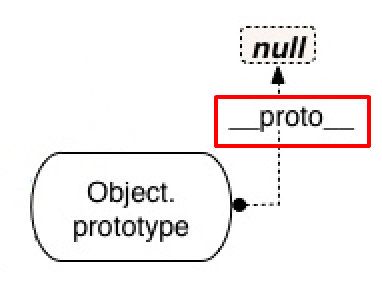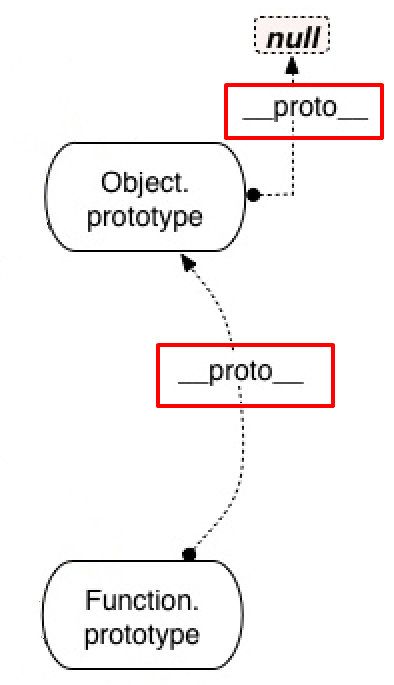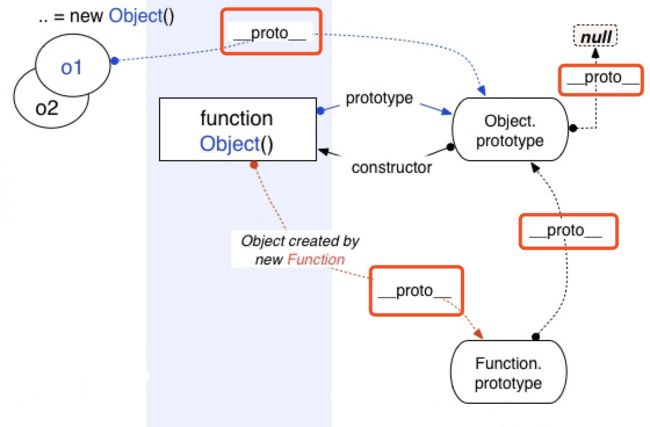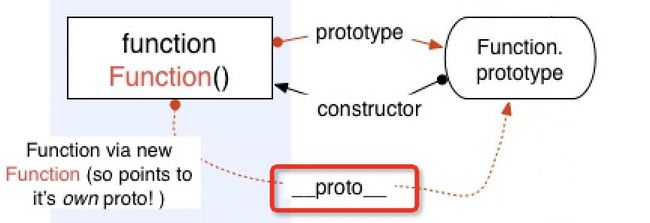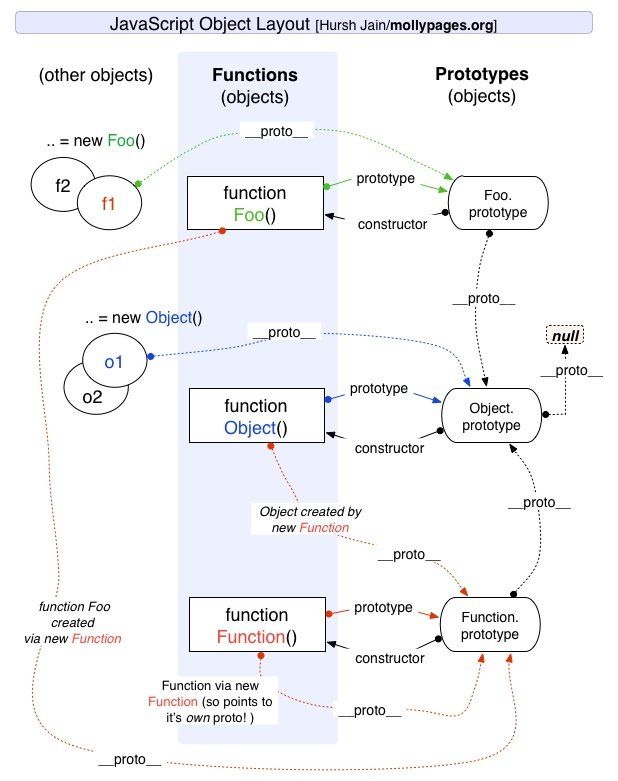深入探究 Function & Object 鸡蛋问题
Object.prototype
我们先来看看 ECMAScript 上的定义(15.2.4)。
The value of the [[Prototype]] internal property of the Object prototype object is null, the value of the [[Class]] internal property is
"Object", and the initial value of the [[Extensible]] internal property is true.
Object.prototype 表示 Object 的原型对象,其 [[Prototype]] 属性是 null,访问器属性 __proto__ 暴露了一个对象的内部 [[Prototype]] 。 Object.prototype 并不是通过 Object 函数创建的,为什么呢?看如下代码
function Foo() {
this.value = 'foo';
}
let f = new Foo();
f.__proto__ === Foo.prototype;
// true
实例对象的 __proto__ 指向构造函数的 prototype,即 f.__proto__ 指向 Foo.prototype,但是 Object.prototype.__proto__ 是 null,所以 Object.prototype 并不是通过 Object 函数创建的,那它如何生成的?其实 Object.prototype 是浏览器底层根据 ECMAScript 规范创造的一个对象。
Object.prototype 就是原型链的顶端(不考虑 null 的情况下),所有对象继承了它的 toString 等方法和属性。
#Function.prototype
我们先来看看 ECMAScript 上的定义(15.3.4)。
The Function prototype object is itself a Function object (its [[Class]] is
"Function").The value of the [[Prototype]] internal property of the Function prototype object is the standard built-in Object prototype object.
The Function prototype object does not have a
valueOfproperty of its own; however, it inherits thevalueOfproperty from the Object prototype Object.
Function.prototype 对象是一个函数(对象),其 [[Prototype]] 内部属性值指向内建对象 Object.prototype。Function.prototype 对象自身没有 valueOf属性,其从 Object.prototype 对象继承了valueOf 属性。
Function.prototype 的 [[Class]] 属性是 Function,所以这是一个函数,但又不大一样。为什么这么说呢?因为我们知道只有函数才有 prototype 属性,但并不是所有函数都有这个属性,因为 Function.prototype 这个函数就没有。
Function.prototype
// ƒ () { [native code] }
Function.prototype.prototype
// undefined
当然你会发现下面这个函数也没有 prototype 属性。
let fun = Function.prototype.bind()
// ƒ () { [native code] }
fun.prototype
// undefined
为什么没有呢,我的理解是 Function.prototype 是引擎创建出来的函数,引擎认为不需要给这个函数对象添加 prototype 属性,不然Function.prototype.prototype… 将无休无止并且没有存在的意义。
#function Object
我们先来看看 ECMAScript 上的定义(15.2.3)。
The value of the [[Prototype]] internal property of the Object constructor is the standard built-in Function prototype object.
Object 作为构造函数时,其 [[Prototype]] 内部属性值指向 Function.prototype,即
Object.__proto__ === Function.prototype
// true
使用 new Object() 创建新对象时,这个新对象的 [[Prototype]] 内部属性指向构造函数的 prototype 属性,对应上图就是 Object.prototype。
当然也可以通过对象字面量等方式创建对象。
- 使用对象字面量创建的对象,其
[[Prototype]]值是Object.prototype。 - 使用数组字面量创建的对象,其
[[Prototype]]值是Array.prototype。 - 使用
function f(){}函数创建的对象,其[[Prototype]]值是Function.prototype。 - 使用
new fun()创建的对象,其中 fun 是由 JavaScript 提供的内建构造器函数之一(Object, Function, Array, Boolean, Date, Number, String 等等),其[[Prototype]]值是 fun.prototype。 - 使用其他 JavaScript 构造器函数创建的对象,其
[[Prototype]]值就是该构造器函数的 prototype 属性。
let o = {a: 1};
// 原型链: o ---> Object.prototype ---> null
let a = ["yo", "whadup", "?"];
// 原型链: a ---> Array.prototype ---> Object.prototype ---> null
function f(){
return 2;
}
// 原型链: f ---> Function.prototype ---> Object.prototype ---> null
let fun = new Function();
// 原型链: fun ---> Function.prototype ---> Object.prototype ---> null
function Foo() {}
let foo = new Foo();
// 原型链: foo ---> Foo.prototype ---> Object.prototype ---> null
function Foo() {
return {};
}
let foo = new Foo();
// 原型链: foo ---> Object.prototype ---> null
#function Function
我们先来看看 ECMAScript 上的定义(15.3.3)。
The Function constructor is itself a Function object and its [[Class]] is
"Function". The value of the [[Prototype]] internal property of the Function constructor is the standard built-in Function prototype object.
Function 构造函数是一个函数对象,其 [[Class]] 属性是 Function。Function 的 [[Prototype]] 属性指向了 Function.prototype,即
Function.__proto__ === Function.prototype
// true
到这里就有意思了,我们看下鸡生蛋蛋生鸡问题。
#Function & Object 鸡蛋问题
我们看下面这段代码
Object instanceof Function // true
Function instanceof Object // true
Object instanceof Object // true
Function instanceof Function // true
Object 构造函数继承了 Function.prototype,同时 Function 构造函数继承了Object.prototype。这里就产生了 鸡和蛋 的问题。为什么会出现这种问题,因为 Function.prototype 和 Function.__proto__ 都指向Function.prototype。
// Object instanceof Function 即
Object.__proto__ === Function.prototype // true
// Function instanceof Object 即
Function.__proto__.__proto__ === Object.prototype // true
// Object instanceof Object 即
Object.__proto__.__proto__ === Object.prototype // true
// Function instanceof Function 即
Function.__proto__ === Function.prototype // true
对于 Function.__proto__ === Function.prototype 这一现象有 2 种解释,争论点在于 Function 对象是不是由 Function 构造函数创建的一个实例?
解释 1、YES:按照 JavaScript 中“实例”的定义,a 是 b 的实例即 a instanceof b 为 true,默认判断条件就是 b.prototype 在 a 的原型链上。而 Function instanceof Function 为 true,本质上即 Object.getPrototypeOf(Function) === Function.prototype,正符合此定义。
解释 2、NO:Function 是 built-in 的对象,也就是并不存在“Function对象由Function构造函数创建”这样显然会造成鸡生蛋蛋生鸡的问题。实际上,当你直接写一个函数时(如 function f() {} 或 x => x),也不存在调用 Function 构造器,只有在显式调用 Function 构造器时(如 new Function('x', 'return x') )才有。
我个人偏向于第二种解释,即先有 Function.prototype 然后有的 function Function() ,所以就不存在鸡生蛋蛋生鸡问题了,把 Function.__proto__ 指向 Function.prototype 是为了保证原型链的完整,让 Function 可以获取定义在 Object.prototype 上的方法。
最后给一个完整的图,看懂这张图原型就没问题了。
#内置类型构建过程
JavaScript 内置类型是浏览器内核自带的,浏览器底层对 JavaScript 的实现基于 C/C++,那么浏览器在初始化 JavaScript 环境时都发生了什么?
没找到官方文档,下文参考自 https://segmentfault.com/a/1190000005754797。对于其观点比较认同,欢迎小伙伴提出不同观点。
1、用 C/C++ 构造内部数据结构创建一个 OP 即 (Object.prototype) 以及初始化其内部属性但不包括行为。
2、用 C/C++ 构造内部数据结构创建一个 FP 即 (Function.prototype) 以及初始化其内部属性但不包括行为。
3、将 FP 的 [[Prototype]] 指向 OP。
4、用 C/C++ 构造内部数据结构创建各种内置引用类型。
5、将各内置引用类型的[[Prototype]]指向 FP。
6、将 Function 的 prototype 指向 FP。
7、将 Object 的 prototype 指向 OP。
8、用 Function 实例化出 OP,FP,以及 Object 的行为并挂载。
9、用 Object 实例化出除 Object 以及 Function 的其他内置引用类型的 prototype 属性对象。
10、用 Function 实例化出除Object 以及 Function 的其他内置引用类型的 prototype 属性对象的行为并挂载。
11、实例化内置对象 Math 以及 Grobal
至此,所有内置类型构建完成。
